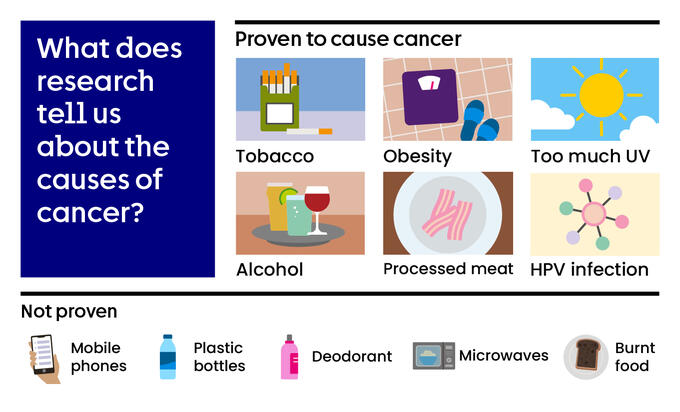Does using plastic bottles and containers cause cancer?
- Using plastic bottles and containers doesn’t cause cancer
- It is safe to drink from plastic bottles and eat food stored in plastic containers or heated in the microwave
- Materials used for storing and packaging food in the UK are regulated for safety
Why are some people worried about using plastic bottles and containers?
Some people are worried about chemicals from plastic bottles and containers passing into their food and drink. For example, the chemical bisphenol A (‘BPA’), which is used to make some plastics. BPA can be found in food containers, reusable bottles and as a lining in food tins and drink cans.
But the amount of BPA that can get into food and drink is too small to cause harm. Our bodies break down most of the BPA within a short time and get rid of it in our pee.
What does the research say about plastic bottles and containers and cancer?
Food and drink that’s stored in plastic bottles and containers doesn’t cause cancer.
Small amounts of chemicals can get into food and drink from plastic packaging. But this is at low levels that are not considered harmful to our health. This is still true in experiments where plastics are heated for hours at a time.
There’s no reliable evidence from studies of people that food and drinks stored in plastic cause cancer. Some studies have suggested that some chemicals found in certain plastics have cancer-causing effects. But these experiments are in animals, or use cells in a lab. In these studies they can put lots of chemical directly into one type of cell. This isn’t realistic as to how we meet plastics in our everyday life, so it’s not good evidence for cancer risk in people.
In the UK, the Food Standards Agency is responsible for making sure that plastic and other materials used for storing food and drink are safe.
What about microwaves, plastic and cancer?
Some chemicals can get into foods from plastics when they’re heated, this includes when microwaving. But there’s no evidence to suggest that this causes cancer. Check that a container has ‘microwave safe’ on it before using it in the microwave.
Despite some common misbeliefs, microwave ovens do not make your food radioactive. It’s also safe to stand in front of the microwave when it’s on!
Microwave ovens use radio waves, a type of radiation that’s too weak to cause cancer by damaging DNA. We have more information on radiofrequency radiation on our page about mobile phones.
What are the proven causes of cancer?
There are many myths, questions and hot topics when it comes to cancer risk. But thanks to decades of research into preventing cancer, we know of proven ways to lower the risk of cancer.
These include not smoking, keeping a healthy weight, staying safe in the sun, cutting down on alcohol and eating a healthy, balanced diet.
We used many references to produce this information, and it is not possible to list them all here. These are the key references with a short explanation of each one:
A comprehensive review on the carcinogenic potential of bisphenol A: clues and evidence
NG Khan and others, Environmental Science and Pollution Research, 2021. Volume 28, Issue 16, Pages 19643-19663
This study looked at the results of 42 studies on BPA and cancer risk. It concluded that BPA is not cancer-causing in people.
The Food Standards Agency, 2017 (updated July 2024). [Accessed September 2024]
A summary of the FSA’s assessment on the safety of BPA.
Food contact materials authorisation guidance
The Food Standards Agency, 2020 (updated 2024). [Accessed September 2024]
A summary of the safety rules in the UK for materials used for food processing, packaging and storage.



